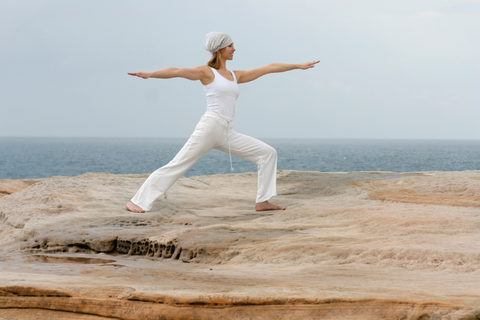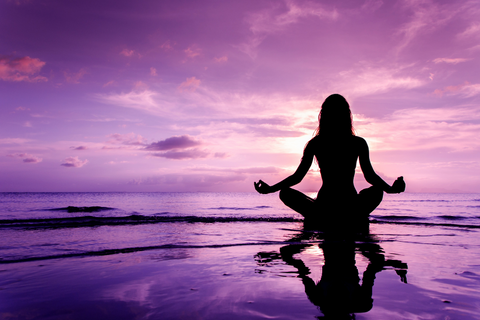
Alternative Therapies To Manage Hot Flashes and Night Sweats
Partager

If you're experiencing hot flashes and night sweats during perimenopause and menopause, you may be looking for ways to manage these symptoms without using hormone replacement therapy. Luckily, there are several alternative therapies that can help reduce the frequency and intensity of hot flashes and night sweats. Here are some of the best options:
Herbal supplements:

There are a number of herbal supplements that can help reduce hot flashes and night sweats. Black cohosh is one of the most well-known herbs for menopause relief, but other options include dong quai (also known as female ginseng), red clover, ginseng, soy, flax, evening primrose oil...
There are a few things to consider before diving right in and purchasing them.
Overall effectiveness:
There are conflicting studies on almost every supplement about their effectiveness. The group sample sizes are small so results should be taken with a grain of salt. However, many women find that they do help with specific symptoms.
Consistency:
In order for supplements to be effective, you must take them frequently and consistently and expect to see results after a month or two at the earliest.
Cost:
Herbal supplements can be costly, especially if you have to take multiple ones 2-3 times per day. It's also important to select high-quality supplements from reputable brands. Speak with your healthcare professional for more guidance.
Adaptation:
Like drugs, your body will get used to supplements if taken for a long enough period. You may have to consistently increase the dosage when you feel your symptoms returning. Kerry Roberts, a pharmacist and menopause practitioner at Brant Arts cautions that supplements are really just lower doses of pharmaceutical drugs and should be treated accordingly.
Consult with a menopause practitioner if considering adding them to your routine. This is also a critical step if you take other forms of medication as supplements can interact with them.
Acupuncture:

The Mayo Clinic finds that it helps to reduce the frequency and severity of hot flashes in some women. According to its website, accupuncture works by stimulating the nervous system to help bring the body's chi back into balance.
Acupuncture involves the placement of thin needles into specific points on the body. There is usually no pain involved. The needles are usually left in for 20-30 minutes.
You may need to commit to multiple sessions over a few weeks or months to see results.
Hypnosis (also called hypnotherapy)

This therapy is based on the power of suggestion. It may help to lessen hot flashes by teaching you how to control your body's response to them.
A 2012 study found that women who underwent hypnosis had a significant reduction in hot flashes compared to those who didn't.
The study noted that after 4 sessions, women had noticed their hot flashes and night sweats had reduced by 70% and after a three month follow-up they were down by 80%. Additionally, hypnotherapy is even good for improving your sleep and lessening your night sweats. Who knew?
You can learn self-hypnosis or see a certified hypnotherapist or even use an app.
Cognitive Behavioual Therapy
This is a form of therapy that can help you understand, become aware of, and manage your hot flashes. It is most successful you suffer from both hot flashes and night sweats so that you can literally practice it while you are aware of them. You can work with a therapist one on one or find an app to help you learn how to manage them. The key is to recognize that one is about to happen and then take the steps to address it. CBT may help decrease the severity and frequency of hot flashes.
Dietary changes

There are a few dietary changes that may help to reduce hot flashes and night sweats. The first one is the addition of two ingredients known as phytoestrogens. Soy and Flax seed both provide a good source of phytoestrogen.
Soy:
Research suggests that soy may help to lessen the frequency and severity of hot flashes. You can get soy in your diet by eating tofu, tempeh, edamame, or soy milk. It's important to choose organic, non-GMO soy products.
Flaxseed:
Flaxseed is a plant-based source of omega-3 fatty acids. These fatty acids are anti-inflammatory and may help to reduce hot flashes. You can add flaxseed to your diet by eating ground flaxseed or flaxseed oil, adding it to smoothies or baking with it.
Berries:
Berries, especially strawberries, raspberries, and blueberries are rich in antioxidants. These nutrients may help to protect your body against hot flashes.
Beans:
Beans are a good source of protein and fiber. They may help to reduce hot flashes by stabilizing blood sugar levels.
Stay hydrated:
Hot flashes and night sweats can worsen when you're dehydrated. Be sure to drink plenty of water throughout the day. If you exercise or drink a lot of coffee, you'll need to drink even more water as both are water-depleting. You can also try herbal teas or fruit-infused water.
Foods and drinks to avoid:
There are also certain foods and drinks that may make hot flashes and night sweats worse. These include:
- spicy foods
- caffeine
- alcohol
- processed foods
- refined sugars
Avoid these foods for a few weeks to see if it makes any difference. If you only suffer from night sweats, you may still be able to eat these foods but eating earlier in the day will help. Also, avoid hot beverages before bed as the hot drink can trigger night sweats.
Lifestyle changes
There are a few lifestyle changes you can make to help reduce hot flashes and night sweats.
Exercise:

Regular moderate exercise has been shown to help reduce the frequency and severity of hot flashes. Just 30 minutes of aerobic exercise most days of the week is all you need.
Low impact exercise such as Yoga and Tai Chi can be particularly helpful as they focus on breathing deeply and slowly. This deep breathing can help to lower your heart rate and relax your body. Take a look at Essentrics as well. This is a great low-impact workout that is a combination of Tai Chi and ballet. It can be done at home through their online classes, or find live classes near you.
Maintain a healthy weight:
Being overweight or obese can make hot flashes and night sweats worse. Losing weight may help to lessen their frequency and severity.
Manage stress through meditation and relaxation exercises:

Tension and stress can aggravate hot flashes. Learning how to relax through meditation, deep breathing, or progressive muscle relaxation may help to lessen their frequency and severity.
Yoga, Tai Chi, and Qigong are all excellent forms of mind-body exercise that can help with relaxation.
Quit smoking:
If you smoke, now is the time to quit. Not only is smoking bad for your health, but it can also make hot flashes and night sweats worse.
Other strategies to help manage hot flashes and night sweats
Dress in layers and breathable (preferably plant-based) fibers
Wearing layers of clothing is a good hack that can help you to feel more comfortable. When a hot flash hits, you can simply remove a layer or two.
What's also important is wearing breathable, heat and moisture-managing fabric. Since hot flashes and night sweats come on quickly and then your body temperature plummets once your hot flash is over you are usually chilled. Your clothing and sleepwear should be able to store some of the heat and release it back to you as your body cools down so your temperature spike and drop are flattened somewhat. Look for fabrics made from hemp and hemp blends, linen, bamboo lyocell.
Hot tip: we created a section dedicated to helping women in perimenopause learn what fabrics will help them stay more comfortable during this often perplexing time in their lives.
A second tier choice would be fine organic cotton, viscose/rayon or modal. These fabrics are more delicate, pill, cling and run easily. They also aren't as effective as the other fabrics for night sweats.
When it comes to bedding, all the same fabric choices apply, but here's another tip: high thread count cotton will actually trap heat and moisture next to your body. Look for sheets made from Pima, Supima, or Egyptian organic cotton fibres, 250-350 thread count. Stay away from polyester sheets if possible. Unless they're designed for heat moderation (some are), they will lock in the heat next to your body.
Fans of all kinds (except for the screaming kinds at concerts)
A small, handheld fan can also be helpful for when a hot flash hits. Besides, you will also look and feel like a southern belle - maybe think about getting your hair done in ringlets with lots of ribbons and change your name to Scarlett (or not!). Consider installing a ceiling fan or using a standing fan. It can make your room feel 5C cooler.
Staying cool in general
Daytime:
Don't leave home without a cold water bottle. When you feel a hot flash coming on, try putting it on the back of your neck - it may help lessen your hot flash.
Night time:
Keep your room temperature between 15-18C (60-65F) for optimal comfort. I like to sleep in a room at about 15C, my husband complains that he has to wear a tuque (ski hat) to bed. It's definitely easier to accomplish a cool room in the winter than summer! For tips on better summer sleeping, read this article.
Use a cooling pillowcase and/or mattress pad - but make sure they work with your dramatic temperature changes and can manage moisture.
Track your hot flashes and night sweats with a journal

This can help you to identify any triggers and figure out what works for you. Be sure to note the time of day, how long the hot flash lasts, what you were doing when it started, your current environment (e.g., temperature, humidity), and how you felt during and after the hot flash. See our night sweats journal on our website.
There are many natural remedies that can help you manage hot flashes and night sweats. These include staying hydrated, avoiding trigger foods and drinks, dressing in layers, using fans, and exercising regularly. While some of these remedies may not work for everyone, they are worth trying if you are looking for a way to manage your hot flashes and night sweats without using hormone replacement therapy.
Disclaimer: The content of this article is for informational purposes only and is not intended to be a substitute for professional medical advice, diagnosis, or treatment. Always seek the advice of your physician or other qualified health provider with any questions you may have regarding a medical condition. Never disregard professional medical advice or delay in seeking it because of something you have read on our website.
